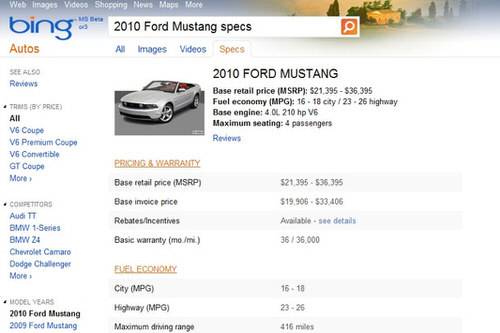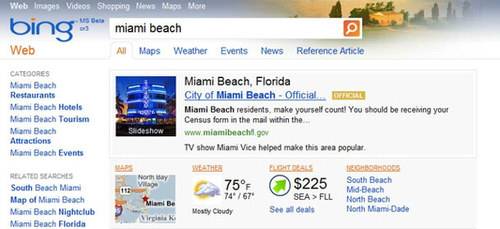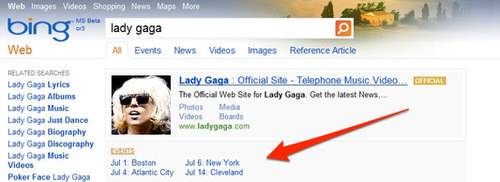Bing now knows a lot more about cars and will also give a select group of users the option to compare the performance of different sports teams. Microsoft just announced these updates at the Search Engine Strategies event in New York. The new comparison answers for sports will be rolled out to only about 5% of Bing’s users at first. In addition, Microsoft will also begin to roll out some minor design changes to a small group of users today that will better highlight Bing’s assets like weather and travel search.

Starting today, mobile users will also see improvements to Bing’s autosuggest feature, which will now include answers for things like stock quotes right in the autosuggest box.

Domain Task Pages for Cars
Whenever a user searches for cars and car-related topics (“2010 Toyota Camry specs,” for example), Bing will now bring up a page will all of the car’s specs instead of directing you to another site with this info. This page will also include links to additional images and videos about the car, as well as the ability to restrict the search query by different trims and links to the specs of cars in the same class.
In Microsoft parlance, these pages are called “domain task pages” and chances are that – if successful – the company plans to roll out more of these for additional topics in the near future. The task pages are part of Bing’s efforts to provide users with specialized answers for popular queries in verticals like weather. According to a recent job posting, other topics for these pages that Microsoft plans to launch in the future could include “movies, music, games and other high-volume domains.” Given that Bing bills itself as a “decision engine,” it only makes sense for Microsoft to try to capture as many popular searches as possible and present its users with relevant answers right on Bing.com instead of sending them on to other sites.

Sports Comparison and UI Changes
A small number of Bing users will now also be able to compare the performance of sports teams by simply typing the name of two teams in the search form. As Stefan Weitz, Microsoft’s Director of Bing, also told us during a briefing earlier this month, about 0.7% of all queries on Bing are comparison searches and the company hopes to capture more of these in the future and present the right answer in Bing instead of sending users to multiple sites.
The same number of users (about 5%) will now also see a new user interface for the boxes at the top of the page that Bing will often display for popular topics. For searches related to cities and towns, for example, these “Bing boxes” will now include info about local weather, a relevant link to Bing Maps, as well as airfare info from your current location (based on your IP address). For popular artists, these boxes will now also include information about upcoming concerts and other relevant information. Sadly, this concert info is based on chronology and doesn’t take a user’s current location into account.

Overall, these are interesting updates – not necessarily because Bing now knows a lot more about cars and sports, but because they show the direction the Bing team is going in. As a “decision engine,” the Bing team’s intend is to give users more information directly on the site instead of just presenting them with a couple of links. While these links can be relevant (and Bing still shows them most of the time, too), the Bing team wants to reduce the number of queries that result in links and increase the number of times the software can present users with direct answers Microsoft has sourced from its own databases or from sources across the Internet.




















